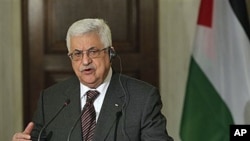Palestinian leaders are searching for alternative ways forward in their bid to establish a Palestinian state, following the collapse of the latest round of peace talks, this year. One way they are trying to gain statehood is by seeking international recognition of a Palestinian state.
Ramallah has all the trappings of a national capital: government ministry buildings, monuments, an office of the president and foreign representation offices that resemble embassies.
Canada, China and Brazil are among the nations that have representative offices.
Although some are staffed by career diplomats, the offices are not considered embassies because past accords prohibit the establishment of embassies and the exercise of diplomatic functions.
This month, the United States abandoned its demand for Israel to stop all construction of Jewish settlements in the West Bank, a condition that the Palestinians have for returning to talks with the Israelis.
With the leverage lost, the Palestinian leadership intensified its efforts to convince as many countries as possible to recognize a Palestinian state. Palestinian negotiator Nabil Shaath leads the effort. And, last week he asked European nations to recognize Palestinian sovereignty. He tells VOA the action aims to raise international pressure on Israel.
"In a situation like the one we're in - particularly because of our decision not to go back to violence - what remains is international action. We're not going to sit on our hands and hope that something will happen from the sky," Shaath said.
Brazil, Argentina and Bolivia recognized a state of Palestine in December, joining a number of other nations that have done so in the past.
Ligia Maria Scherer, a career diplomat who holds the rank of ambassador, heads Brazil's representation office in Ramallah. She explains why her government recognized a Palestinian state.
"Brazil believes that with this granting of recognition, we can contribute to peace in the region," Scherer said. "That is the objective, the purpose of everything that Brazil does concerning the question of Palestine and Israel."
The Palestinians hope to eventually have the United Nations recognize their sovereignty.
Lobbying individual countries to grant recognition puts them on track to winning a majority of votes in the General Assembly. Their goal is to get enough support to one day win U.N. Security Council approval. Analysts say this is improbable because the United States does not support measures that Israel considers hostile.
The Israeli government says the decision by Brazil and others to recognize a Palestinian state hurts the peace process.
Yossi Beilin is an Israeli politician who was deeply involved Israel's negotiation of the Oslo accords in the 1990's. He doubts that achieving diplomatic recognition -- and words of support from nations with little influence in the Middle East -- will bring the Palestinians closer to having their own state.
"I understand their frustration, but I must admit that the solution is not a very serious one," Beilin said. "Unless there is a withdrawal of Israel from the West Bank there won't be a Palestinian state there. And, imagine that the whole world recognizes a state which doesn't exist? So what? Psychologically, it might help. Politically, it might enhance the current Palestinian leadership. But if you ask me whether this is an alternative, it is like saying, since you don't want to marry me, I will read a book."
The government of Israeli Prime Minister Benjamin Netanyahu says it remains committed to reaching a peace agreement. However, the Israeli leadership rules out giving in to some of the Palestinians' key demands including a withdrawal from the West Bank and East Jerusalem, lands formerly controlled by Jordan that were captured by Israel following its victory in the 1967 Arab-Israeli war.
Beilin and others say that with the gap between Israelis and Palestinians as wide as it is, there is little chance of a permanent agreement under the current Israeli administration. Israel continues to build on its settlements in the West Bank and controls a large portion of the territory that would be part of a future Palestine.
For now, the decision by some nations to give diplomatic recognition to a Palestinian state seems to remain a merely symbolic gesture.





